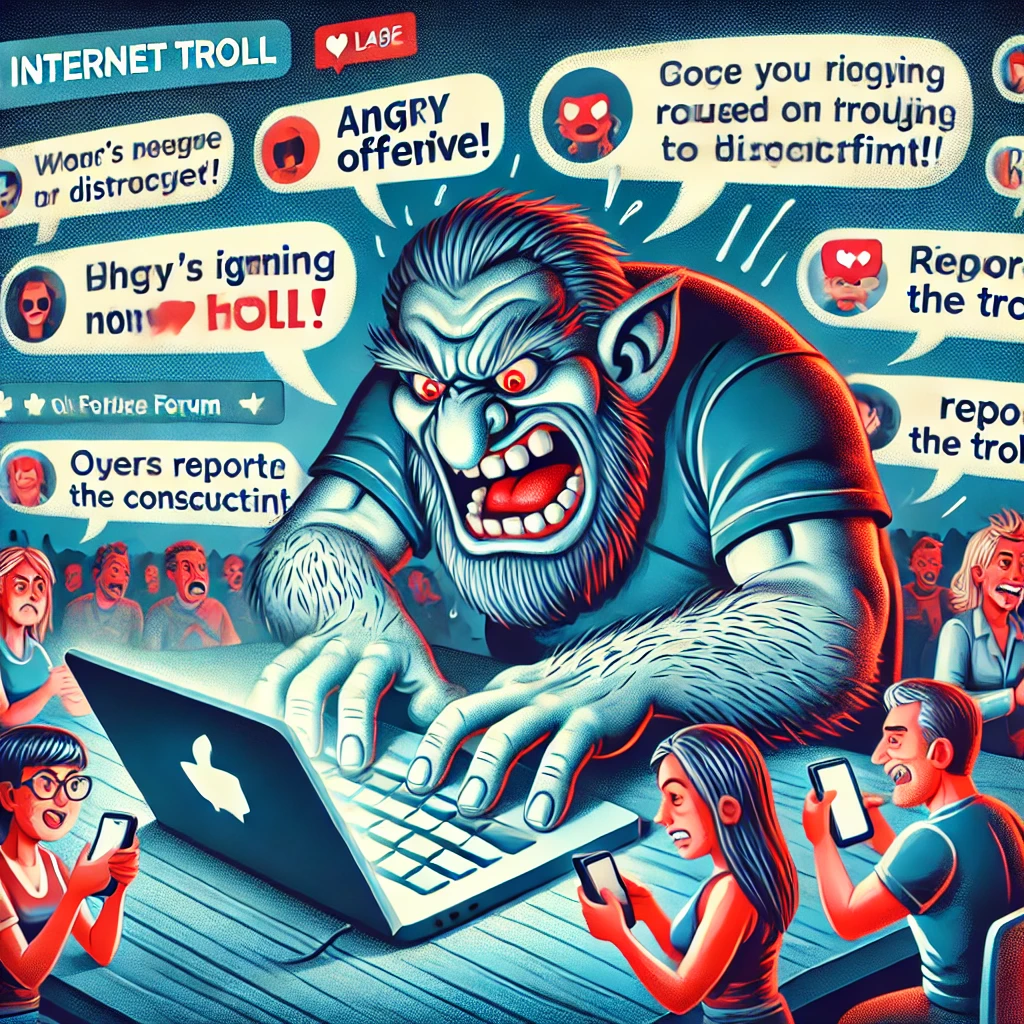An internet troll is an individual who deliberately antagonizes, provokes, or upsets others online by posting inflammatory, unnecessary, or offensive comments or content. Their primary objective is to disrupt conversations, generate emotional reactions, and create chaos within online communities, whether on social media platforms, forums, blogs, or comment sections. Unlike users who may unintentionally cause friction in a discussion, trolls thrive on deliberately causing disruption.
Internet trolls have become a well-known phenomenon in the digital age, often contributing to negative online experiences and harming the constructive and positive communication that most platforms aim to foster.
Defining the Behavior of an Internet Troll
Trolls often use various tactics to elicit reactions from others. Their behaviors include:
- Posting Offensive Content
Internet trolls frequently post offensive, crude, or hateful comments designed to provoke strong emotional responses. These comments may target individuals, groups, or sensitive topics like politics, religion, or social issues. - Engaging in Personal Attacks
Trolls often direct their efforts at individuals by launching personal attacks or insults. By ridiculing or demeaning others, trolls aim to provoke heated responses and draw more attention to the conversation they have derailed. - Derailing Discussions
Trolls disrupt conversations by diverting the topic or introducing irrelevant, inflammatory comments. For example, in a discussion about climate change, a troll might post conspiracy theories or attack others for their beliefs, steering the conversation away from the original topic. - Spreading Misinformation
Some trolls use misinformation or false claims to create confusion or division within online communities. By intentionally spreading incorrect information, they seek to stir controversy and disrupt healthy dialogue. - Playing the “Devil’s Advocate”
Trolls may position themselves as contrarians in any given conversation, always taking an opposing or provocative stance regardless of the issue at hand. This is done not to encourage healthy debate but to irritate and antagonize others.
Motivations Behind Trolling
Trolls are driven by various motives, ranging from personal amusement to more malicious intentions. Common reasons for trolling include:
- Entertainment (For the Lulz)
Many trolls engage in disruptive behavior purely for amusement. They enjoy provoking others and witnessing the reactions their inflammatory posts generate. In internet slang, this is often referred to as doing something “for the lulz” (laughs). - Desire for Attention
Trolls crave attention, and by disrupting conversations, they force others to engage with them, even if the attention is negative. Their behavior ensures they remain at the center of the conversation, no matter how disruptive. - Power and Control
Trolling can give individuals a sense of power or control, as they can manipulate the emotions and reactions of others. By causing disruption and chaos, they can exert influence over online conversations. - Malice or Hatred
Some trolls are motivated by hatred or prejudice, using trolling as a vehicle to harass or spread harm. These trolls may target individuals based on race, gender, religion, or other personal characteristics, contributing to toxic online environments. - Disruption for Political or Ideological Reasons
In some cases, trolls disrupt discussions to promote a particular political agenda or ideology. They may aim to silence dissent, mislead others, or manipulate public opinion.
The Impact of Trolling on Online Communities
- Creating a Toxic Environment
Trolls often contribute to a hostile or toxic environment where meaningful discussions are overshadowed by negativity. Communities that are frequently targeted by trolls may experience a decline in participation, as users may avoid engaging to steer clear of confrontations. - Derailing Productive Conversations
Trolling disrupts the flow of conversations and shifts attention away from the original topic. When online communities or discussion threads are constantly derailed, it becomes difficult to engage in meaningful or constructive dialogue. - Emotional Distress for Targets
Internet trolls can cause significant emotional distress for individuals, especially when personal attacks or targeted harassment are involved. Victims of trolling may experience anxiety, frustration, or even feelings of helplessness as they become embroiled in confrontations. - Spreading Misinformation
Trolls that intentionally spread false information can contribute to the erosion of trust in online spaces. Their actions may cause confusion, contribute to misinformation, and disrupt the sharing of accurate and reliable information.
Dealing with Internet Trolls
- Ignore and Do Not Engage
One of the most effective strategies for dealing with trolls is to ignore them. Trolls thrive on reactions, and by not responding, you deprive them of the attention they seek. In many cases, trolls will move on when they do not get the engagement they desire. - Moderation and Reporting
Online platforms often have moderation tools in place to handle trolling behavior. Reporting trolls to moderators or administrators can help remove disruptive content and maintain a positive online environment. Some platforms also allow for blocking or banning persistent trolls. - Enforcing Community Guidelines
Websites and online communities should have clear guidelines in place that outline acceptable behavior. Consistently enforcing these guidelines can help prevent trolling and foster a more respectful online environment. - Educating Users
Educating online users about the nature of trolling and how to handle it can minimize its impact. Users should be encouraged to avoid engaging with trolls and report inappropriate content when necessary.
Internet trolls are individuals who intentionally disrupt online discussions and antagonize others through offensive, inflammatory, or irrelevant comments. While their motivations may vary from amusement to malice, the effects of trolling can be damaging to online communities. By recognizing trolling behavior and employing strategies to deal with it—such as ignoring, reporting, and enforcing community standards—users can help reduce its impact and foster a more positive, respectful online environment.
Key Takeaway
Trolling thrives on attention and disruption. To counteract it, it’s essential to avoid engaging with trolls, leverage platform moderation tools, and promote positive online interactions.


